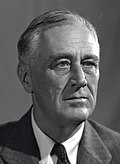This article needs additional citations for verification .(May 2023) |
| |||||||||||||||||||
| |||||||||||||||||||
| |||||||||||||||||||
From March 14 to May 19, 1944, voters of the Democratic Party elected delegates to the 1944 Democratic National Convention where the party chose its nominee for president in the 1944 United States presidential election. [1] The very popular incumbent President Franklin D. Roosevelt was nominated at the convention.

